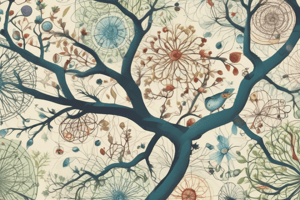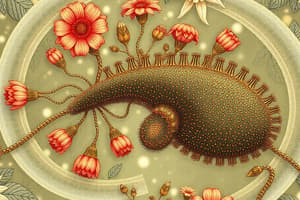Podcast
Questions and Answers
Which branch of biology focuses specifically on the study of microorganisms?
Which branch of biology focuses specifically on the study of microorganisms?
- Ecology
- Botany
- Microbiology (correct)
- Zoology
What is the primary function of photosynthesis in plants?
What is the primary function of photosynthesis in plants?
- To convert chemical energy into glucose
- To convert light energy into chemical energy (correct)
- To synthesize proteins from amino acids
- To produce ATP from glucose
Which of the following statements best describes the concept of homeostasis?
Which of the following statements best describes the concept of homeostasis?
- The maintenance of stable internal conditions (correct)
- The generation of energy from sunlight
- The transmission of genetic information
- The evolution of species over time
Which level of biological organization is defined as a community of living organisms and their physical environment?
Which level of biological organization is defined as a community of living organisms and their physical environment?
What is the main focus of genetics as a branch of biology?
What is the main focus of genetics as a branch of biology?
Which process is responsible for converting glucose into ATP in the presence of oxygen?
Which process is responsible for converting glucose into ATP in the presence of oxygen?
Which component of cells is responsible for providing the basic structure and function?
Which component of cells is responsible for providing the basic structure and function?
In the context of evolution, what is natural selection primarily responsible for?
In the context of evolution, what is natural selection primarily responsible for?
Study Notes
Overview of Biology
- Definition: Biology is the scientific study of life and living organisms, encompassing various aspects such as structure, function, growth, evolution, and distribution.
Major Branches of Biology
- Botany: Study of plants, including their physiology, structure, genetics, ecology, and classification.
- Zoology: Study of animals, covering their behavior, physiology, classification, and distribution.
- Microbiology: Study of microorganisms, including bacteria, viruses, fungi, and protozoa.
- Ecology: Study of interactions between organisms and their environment.
- Genetics: Study of heredity and variation in living organisms.
- Cell Biology: Study of cell structure, function, and processes.
- Evolutionary Biology: Study of the origins and changes in the diversity of life over time.
Essential Concepts
- Cell Theory: All living organisms are composed of cells, and all cells arise from pre-existing cells.
- Evolution: The process through which species change over time due to natural selection and genetic drift.
- Homeostasis: The ability of an organism to maintain stable internal conditions despite external changes.
- Metabolism: The set of life-sustaining chemical reactions in organisms, including anabolism and catabolism.
- DNA and RNA: Nucleic acids responsible for the storage and transmission of genetic information.
Key Processes
- Photosynthesis: Process by which green plants and some other organisms convert light energy into chemical energy in the form of glucose.
- Cell Respiration: The metabolic processes that convert glucose into ATP (energy) using oxygen.
- Protein Synthesis: Process of creating proteins from amino acids based on the information in mRNA.
Levels of Biological Organization
- Biosphere: Global sum of all ecosystems.
- Ecosystem: Community of living organisms and their physical environment.
- Community: Different species living together in a particular area.
- Population: Group of individuals of the same species living in a specific area.
- Organism: Individual living entity.
- Organ System: Group of organs working together for a specific function.
- Organ: Structure composed of different types of tissues.
- Tissue: Group of cells with a common structure and function.
- Cell: Basic unit of life.
- Organelle: Specialized structure within a cell.
Methods of Study
- Observation: Noting and recording phenomena to gather data.
- Experimentation: Conducting controlled tests to explore hypotheses.
- Modeling: Using computational or physical models to simulate biological processes.
- Field Studies: Observing organisms in their natural habitat to gather ecological data.
Importance of Biology
- Understanding Life: Provides insights into the complexity and interconnections of life forms.
- Medical Advancements: Contributes to improvements in healthcare, pharmaceuticals, and biotechnology.
- Environmental Conservation: Informs strategies for biodiversity conservation and ecosystem management.
Overview of Biology
- Biology is the study of life and living organisms.
- It covers aspects like structure, function, growth, evolution, and distribution.
Major Branches of Biology
- Botany studies plants, including their structure, physiology, genetics, ecology, and classification.
- Zoology focuses on animals, covering their behavior, physiology, classification, and distribution.
- Microbiology studies microorganisms, such as bacteria, viruses, fungi, and protozoa.
- Ecology investigates the interactions between organisms and their environment.
- Genetics studies heredity and the variation in living organisms.
- Cell Biology focuses on the structure, function, and processes within cells.
- Evolutionary Biology studies the origins and changes in the diversity of life over time.
Essential Concepts
- Cell Theory states that all living organisms are composed of cells, and all cells arise from pre-existing cells.
- Evolution is the process of change in species over time, driven by natural selection and genetic drift.
- Homeostasis is the ability of an organism to maintain a stable internal environment despite external changes.
- Metabolism involves the set of life-sustaining chemical reactions in organisms, encompassing anabolism (building up) and catabolism (breaking down).
- DNA and RNA are nucleic acids responsible for storing and transmitting genetic information.
Key Processes
- Photosynthesis is the process by which green plants and some organisms convert light energy into chemical energy (glucose).
- Cell Respiration uses oxygen to convert glucose into ATP (energy) for cellular processes.
- Protein Synthesis involves creating proteins from amino acids based on the information in mRNA.
Levels of Biological Organization
- Biosphere: The global sum of all ecosystems.
- Ecosystem: A community of living organisms and their physical environment.
- Community: Different species interacting within a particular area.
- Population: Group of individuals of the same species living in a specific area.
- Organism: Individual living entity.
- Organ System: Group of organs working together for a specific function.
- Organ: Structure composed of different types of tissues.
- Tissue: Group of cells with a common structure and function.
- Cell: Basic unit of life.
- Organelle: Specialized structure within a cell.
Methods of Study
- Observation: Noting and recording phenomena to gather data.
- Experimentation: Conducting controlled tests to explore hypotheses.
- Modeling: Using computational or physical models to simulate biological processes.
- Field Studies: Observing organisms in their natural habitat to gather ecological data.
Importance of Biology
- Understanding Life: Offers insights into the complexity and interconnections of life forms.
- Medical Advancements: Contributes to improvements in healthcare, pharmaceuticals, and biotechnology.
- Environmental Conservation: Informs strategies for biodiversity conservation and ecosystem management.
Studying That Suits You
Use AI to generate personalized quizzes and flashcards to suit your learning preferences.
Description
Explore the fascinating world of biology, covering its major branches such as botany, zoology, microbiology, ecology, and genetics. This quiz will test your knowledge on essential concepts including cell theory and evolutionary biology. Discover how living organisms interact with their environment and evolve over time.




